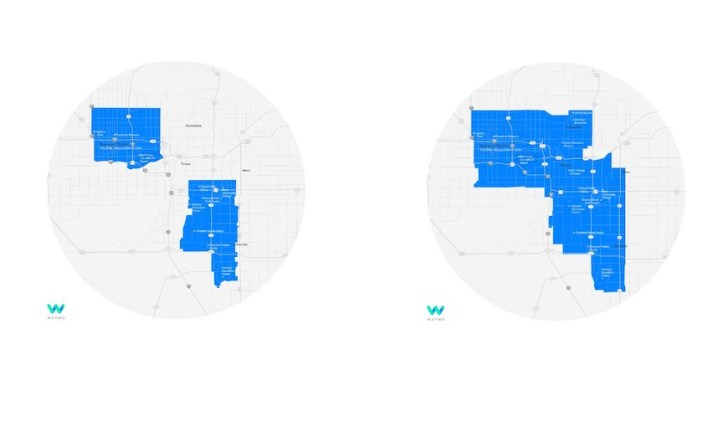Waymo is expanding the service area for its robotaxi service in Phoenix, Arizona, and San Francisco, California, paving the way for longer trips across more communities.
In a blog post on Thursday, May 4, Alphabet-owned Waymo said it’s doubling its service area in Phoenix and as a result now serves 180 square miles of The Valley, an expansion that it claims makes it “the largest fully autonomous service area in the world.”
It’s also nearly four times the size of the initial service area when its robotaxi service opened to the public in 2020 following years of testing.
The enlargement of the service area covers Scottsdale for the first time, almost all of Tempe, and gives additional access to Chandler and Mesa.

Waymo said that regular folks in the new and existing coverage locations can hail a ride with the Waymo One app, “whether they’re Arizona State University students commuting between campuses or pin-seeking golfers on vacation.”
The company’s expansion in San Francisco is a little more limited but that’s partly because its service already covers almost all of the peninsula, with its autonomous cars now making it to Fisherman’s Wharf and North Beach.
Waymo is still waiting for permission from regulators to open up its robotaxi service in San Francisco to one and all, so for now, only those enrolled in Waymo’s Trusted Testers program can book one of its self-driving taxis.
Waymo also revealed that it’s currently operating more than 10,000 trips per week to public riders via the Waymo One app, and is aiming to increase this to 100,000 trips by the summer of 2024.
“Waymo One remains the only and largest 24/7 fully autonomous ride-hailing service in the world, serving thousands of rides in multiple key markets, and we’re scaling quickly,” said Saswat Panigrahi, Waymo’s chief product officer. “These latest expansions in Metro Phoenix and San Francisco will help us provide more trips to more riders in more places, and are a big step forward on the road to growing our business.”
The company is intent on continuing to improve its technology, with recent enhancements including improved hand gesture detection, more versatile multi-point maneuvers, and improvements to driving performance in challenging weather conditions.
Editors' Recommendations
- Waymo robotaxi attacked and set on fire in San Francisco
- Beleaguered robotaxi startup Cruise lays off quarter of workforce
- Cruise woes prompt production halt of fully driverless van
- Waymo expands robotaxi service area in San Francisco
- Cruise autonomous vehicle drives over woman just after she was hit by another car

